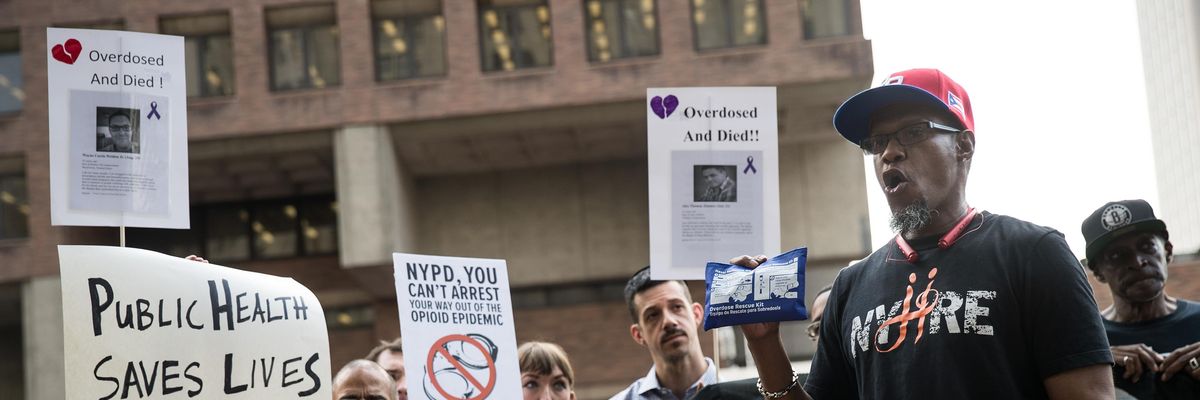A leading U.S. drug policy reform advocate on Thursday welcomed the inclusion of harm reduction policies in President Joe Biden's inaugural National Drug Control Strategy, a plan that comes amid a record surge in fentanyl-driven overdose deaths.
"We must embrace the evidence-based public health approaches we know work and save lives."
"We applaud the Biden-Harris administration for taking the historic step--to support access and funding for harm reduction services and reduce barriers to lifesaving medications," Grant Smith, deputy director of the Office of National Affairs at the Drug Policy Alliance, said in a statement. "Despite over one million lives lost to drug overdose over the last 20-plus years, this is the first time an administration has included harm reduction in the National Drug Control Strategy."
"The administration should continue to focus on its promise of equity by decreasing racial disparities in drug policy and the overdose crisis," Smith asserted.
"From 2020 until now, Black people have experienced a 48.8% increase in overdose mortality, Hispanic or Latino people experienced a 40.1% increase, and American Indians and Alaska Natives experienced the highest increase in overdose mortality of all ethnic groups" he noted. "This cannot continue."
Citing the "heartbreaking toll" of 106,854 U.S. overdose deaths over the past year, the White House said its 2022 National Drug Control Strategy "focuses on two critical drivers of the epidemic: untreated addiction and drug trafficking."
In addition to addressing untreated addiction for people at risk of overdose, the administration's plan "calls for greater access to harm reduction interventions including naloxone, drug test strips, and syringe services programs."
Naloxone--sold under the brand name Narcan--is an opioid blocker than can rapidly reverse the life-threatening effects of an overdose. Testing strips detect fentanyl--a powerful synthetic opioid added to various drugs to increase their potency--but are outlawed as paraphernalia in many states.
Dr. Rahul Gupta, director of the White House Office of National Drug Control Policy, toldNPR that "the most important action we can take to save lives, right now, is to have naloxone in the hands of everyone who needs it without fear or judgment."
"The most important action we can take to save lives, right now, is to have naloxone in the hands of everyone who needs it without fear or judgment."
Biden's strategy "directs federal agencies to integrate harm reduction into the U.S system of care to save lives and increase access to treatment." It also calls for "collaboration on harm reduction between public health and public safety officials, and changes in state laws and policies to support the expansion of harm reduction efforts across the country."
The strategy's anti-trafficking elements include a proposed $300 million increase--"one of the largest ever"--in U.S. Customs and Border Protection funding, as well as " efforts to strengthen domestic law enforcement cooperation."
While the White House says the plan aims to "advance racial equity in the investigation, arrest, and sentencing for drug-related offenses," Smith expressed disappointment in the administration's perpetuation of the failed War on Drugs.
"Criminalization approaches only saddle mostly Black, Hispanic, and Indigenous people with criminal legal records and often incarceration, which increases their risk for infectious diseases, overdose, and death," he said. "Prioritizing federal spending on public health rather than enforcement and interdiction is the best path forward."
Smith contended that with so U.S. overdose deaths and a crisis that costs the nation's economy more than $1 trillion annually, "we must embrace the evidence-based public health approaches we know work and save lives."
"But," he stressed, "it must be done outside of the harmful apparatus of the drug war to be effective and provide the kind of racial equity this administration has long promised."

